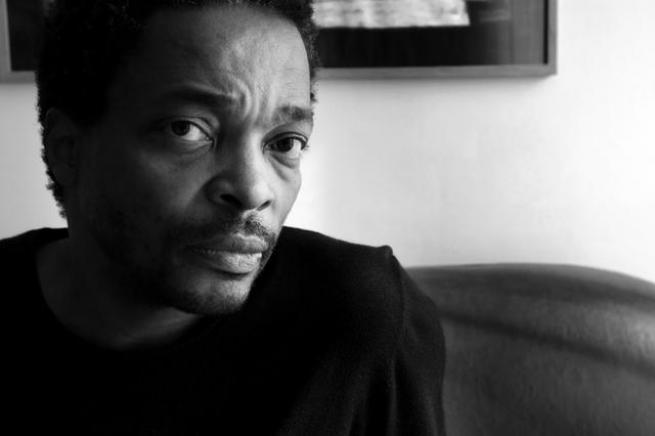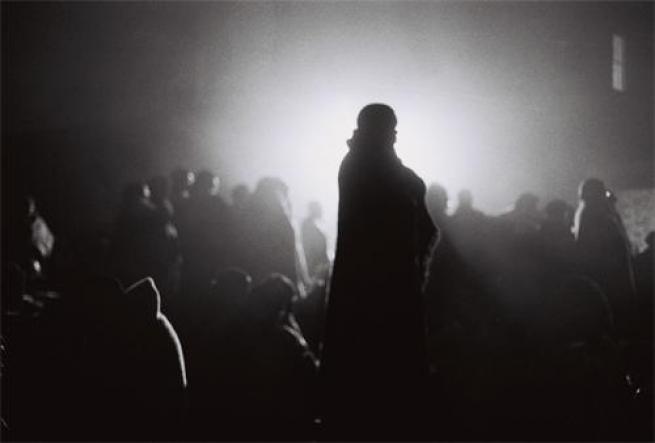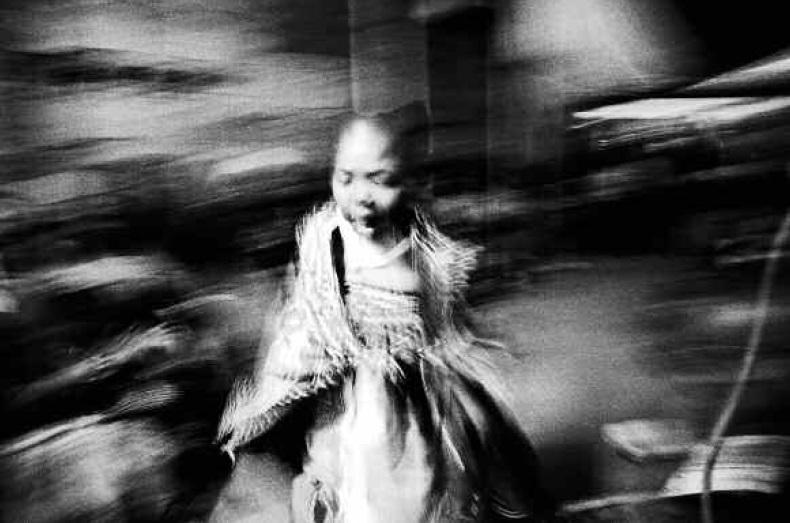When I discovered the question, I felt tempted to parody this American actor in this ad for some coffee and to answer: what else? I am the son of Lydia and Simon, two bassa heroes. I am the result of those two beings from a people who fought forcefully for their freedom; two children of Africa. So, what else? What else than that land of shadows and ghosts waiting to be revealed? What else than those millions of stories waiting to be told? Those stories I would read for my grandfather without really understanding, but captured by the mystery of books that could contain a whole world within their pages. Wars, marvels, people, love, hatred, all translated in the subtle magic of words. Conrad did not know to which extend he was right when he called this continent the heart of darkness. He did not know what darkness was in reality and found the right words out of a misunderstanding.
What do we say when we say Europe or Africa? People are always convinced to say something when they say “Africa”, which I admire, because I personally still don’t know what is Africa. I say Africa knowing that if we were looking for a definition that would perfectly define the complexity of the continent, we would find ourselves lost in limbo. Just like this man who came to me during the exhibition Africa Remix. He was convinced that he knew what Africa was and accused me of being a troublemaker because I invited some artists from Egypt, Tunisia, and Morocco. I just showed him a map of Africa, produced by the French National Institute of Geography. He left me alone, but I am certain that he didn’t change his twisted mind.
The point from which we are no longer able to recognize what we think we know is summarized by that very moment when we lose grasp with a tangible reality to transform it into our own. The realm of language is the realm of experience and the realm of experience is the realm of perception. And the body, because it is visible, is appearance and therefore, a source of misunderstanding. Instead of wanting, at any cost, to localize it in a given geography, at the risk of falling into the trap of preconception, we should rather consider it as an empty canvas, a mask, or a translation. I could decide that, to quote Bili Bidjocka, I am the only woman in my life. It would become my reality and my story, my saying and nobody could have the right to deny it. I could say that I am a Peruvian or whatever I want to be. Why not a bird? But words possess something that the body is lacking: the ability of transforming what we see into something else. This is why we tend to believe in their lies. At the beginning, says the Bible, was the verb. But even the verb requires some mastering. It is not enough to claim to be a specialist of some speciality to be able to convince an audience. It is not given to everyone to be a good storyteller. We, every now and then, cross the path of those “specialists”. They come with their résumé that they hold like a flag and explain that they have been working for thirty years on, let’s say, Cameroon. They have published numerous books and claim to be the authority on the matter. And from the very minute they discover that I am of Cameroonian origins, they start to lecture me on Cameroon. But what could their thirty years of fieldwork mean, when compared to my memory? That memory encapsulated in my body and that tells me stories that no book contains? The body is a perfect shadow. It is the object we think we see when, in fact, we do not have a clue about its meaning.
I am very light sensitive. I work in shadows and I try to give forms to shadows, not contours but forms. This is, for instance, the way I consider an exhibition. From the concept to the show, there is this complex route that leads to a physical production. The same could apply to any form of art. I like the idea of shadows, because, it deals with the invisible but yet present. Shadows are not absent, but hidden, ungraspable. When the Plaza de Mayo widows were gathering to claim their beloved ones who were arrested by the dictatorship, they were in an intimate communion with the disappeared (los disaparecidos). In a beautiful song, “Dancing with the missing”, the singer Sting tried to describe what they were experiencing. In the same manner, when Amos Tutuola’s main character in his Palm Wine Drunkard decides to go in the forest of ghosts to retrieve his palm-wine collector, he is faced with ghosts. We retrieve the same word in the term ghostwriter, which designates the one who, behind the scene, performs a work that he will never be credited with. It is interesting to note that in French, ghostwriter translates to “nègre”, which means nigger.
 Simon Njami. Photo David Damoison
Simon Njami. Photo David Damoison
We can’t, at this point not recall Ralph Ellison’s “Invisible man”, where the African American writer used to describe the denied social existence of black population during the segregation times. Vito Corleone, the hero of the Francis Ford Coppola’s Godfather, is in his own way, invisible too. But in his case, invisibility means power. He operates in the shadow, making to people offers that they cannot refuse. Using them like a pupettist uses his puppets. Without ever standing under the sunlight, but, on the contrary, hiding in order to let us believe that his dolls have a life of their own. I like the forces behind. Those forces that cannot be grasped nor described have always stimulated my imagination, as something that would belong to realm of sensations or intuition. It is, for a curator or a writer or an artist an ideal position. It is Santu Mofokeng, the South African photographer, embarking into the improbable mission of Chasing Shadows.
I think the shadows are at the heart of any artistic attempt to reveal the invisible. It reminds me of a Hegel statement: we cannot know what we know. What seems interesting to me is that this definition could perfectly fit what I envision as “shadowiness”. And stories are fictions made true, as French writer Boris Vian put it in the introduction of his novel L’Écume des jours: this story is true, from beginning to end, for I invented it, from beginning to end. This is what I like about stories. Stories are just pure fictions, little arrangements we make about our lives. It represents the perfect translation that could enable us to actually decipher the meaning of a shadow. But let us now try to answer the very question that we are concerned with: what is Africa? I could propose that Africa is shadow. It is an invention that we invest with our emotions, ideas and preconceptions. Africa is what cannot be shown but is yet an evidence, as James Baldwin suggested in a collection of essays that were gathered under the title: The Evidence of Things not Seen.
What stories allow us to do is to tell about moments, ideas, feelings that are invisible; to create a form of “usness” that goes beyond any border. When a storyteller talks, he is at the centre of the game. We see him and we know that he is creating a world of fantasy. He remembers, and while remembering, he creates. The listener is never asked to agree but to believe. A story is not directed to our brains but to our inner self. Any time I hear “once upon a time”, I am trapped. I retrieve those magic moments of my childhood when no reality was forced upon us. A land of freedom and of oblivion. I sink. If the storyteller is good. If the power of his gaze can become mine. In Cameroon, I remember that fairy tale would always start by a dialogue between the storyteller and his audience with the words: a ginglayè!, and the audience would respond: wessé! And the storyteller would end his ritual introduction by: mi ang mi lam (nice stories, mi ntebek di Benguè (Europe’s lies).
There are (of course) different ways of telling a story, and the images that are suggested cannot come to life if a gaze does not inform them. And what is a gaze? A gaze is something that organizes the world according to a persona. A gaze is a body, a gaze, as suggested in “once upon a time” that would become the embodiment of time. We could stop using the expression “point of view” and replace it by “point of time”. Because the way I define my time has nothing to do with the sole ability to see. In Havana, a friend who came late for a meeting we had, started to make jokes on the Cuban time. There are a lot of those about Africa as well. But that day, I did not want to be associated with any time I would not have chosen. So I took off my African mask, the more visible for a Cameroonian, and switched it for a Swiss one. The one that allows me to play with perceptions and evidences. It was an epistemological game into which I ventured with great delight. Time, masks, appearances… I could disappear whenever I wanted to, and come back in a new form. Like a ghost. Like a work of art that always contains a polysemy of meanings.
When we talk about seeing or feeling, it equals to talking about reading. We are beings who are made out of a lot of things and these are the things that inform about our gaze and the way we deal with our very private story. History, in that particular private sense, could be assimilated to a ruin, or to an ensemble of ruins. Toshome Gabriel, a very fine scholar who, for that reason was more of storyteller, gave a brilliant paper on memory proposing that memory was to be considered in the same manner we look at ruins. And the example he gave to illustrate his proposition was probably invented, maybe not, but it did not really matter. It was a beautiful philosophical metaphor. He told about a book that changed his life when he was 17. The experience had been so intense that he started lecturing all his friends about it, convincing them to enjoy the same journey he had. Thirty years later, he bumped into the same book and read it again. He could hardly recognize it. He could hardly believe that the book he was holding in his hand was the same that he had been preaching about. What was remaining was just a feeling, was just something that cannot be written, something that only him could capture and of course, that evolved in the course of his life to something completely different. The transformation he experienced as a teenager was no longer there. And that experience he has been trying to share could probably not be shared, but it was his, in his most intimate self.
 Andrew Tshabangu, On sacred ground
Andrew Tshabangu, On sacred ground
The gaze is our position in time and space. It is what enables us to read a book that will become unique to our memory. That form of memory could have been named shadows because it is composed of an ensemble of contradictory items that Henri Delacroix, a French psychologist called the “the chaotic world of sensations”. What is meant here is that we all share the same inner chaos but that what we call language is the tool that can transform this chaos into forms. The same chaos may take different forms. According to the language that is used. And the main concept language brings fore is that of translation. What is strong about this translation is the idiom because, by essence, it cannot be translated without being reinvented, like a poem or a joke. If you don’t know the joke, you don’t get the joke. So what is it that art can do? What is its function in the constitution of a memory and what kind of ruins does it leave behind? What are the ruins I am referring to when I say Africa?
In his attempt to define, or simply to find out what was Africa, artist El Anatsui required time that is always associated with wisdom. A time that would, like in Borges’ Aleph, encompass all times; something none of the performers could recognize fully as his. “Last time I tried to write to you about Africa, I used a letter headed parchment. My letter was full of blank spaces. I can fill some of those spaces now, because I have grown older.” But at the same time we become older, our memories face the risk of fading away. To become blurred, to become an ensemble of confused remembrances that recreate a reality that, like Toshome Gabriel proposed it, maybe never existed. We can’t, therefore, avoid misunderstandings because we deal with something very personal and intimate. I tend to believe that time is a dance. And a good dance has to be shared.
The misunderstandings I have mentioned remind us of our humanity and of that forgotten story that sleeps in all minds. That is the reason why I dislike globalism. We cannot all dance a dance that we have created, in the same manner, with the same rhythm. When different people tell a story, it becomes a different one. We need all those stories to forge our own. I hate the global because the global wants to tell me that there is only one language and only one way to tell stories and only one way to read the world. I love the local because the local creates misunderstandings and those misunderstandings are the spaces in between where a dialogue can occur. We need this space in between that creates something else that forces us to forget what we think we know and to realize that we do not know what we know. So any time a story is told, we may pretend to believe it. But any time we tell a story ourselves, we should bear in mind that it is a fiction.
Jean-Paul Sartre was ironically describing the white man gaze founding his African colonies, opposing light and shadows: “For three thousand years, the white man has enjoyed the privilege of seeing without being seen; he was only a look – the light from his eyes drew each thing out of the shadow of its birth; the whiteness of his skin was another look, condensed light. The white man – white because he was man, white like daylight, white like truth, white like virtue – lighted up the creation like a torch and unveiled the secret white essence of beings.” From that perspective, some people could feel free to call the African continent “The Heart of Darkness”. We should not mind that darkness, as long as we associate it with the magic of the shadow, the magic of the unseen that necessarily requires an initiation to become intelligible. That magic is contained in the spoken words; in the mystery of story telling. It does not claim any objectivity, contrary to what is called history. History can only be performed and whenever I talk about Africa, I have to perform it. And my performance, varying according to my audience and being the fruit of my encounter with the “other” is never the same.
I have this dream that comes regularly. It is always night, in some forest. It is hot and I sweat. And a strange music starts. And I feel my feet, my arms, my head, my entire body taken by the rhythm. I close my eyes. When I open them, I see dozen of forms inviting me to join them. I see Guevara, I see Boris Vian, I see Pushkin, I see Cassiopeia, I see the Queen of Sheba and the Queen Nginza. They wave at me. And I follow them. And we dance.
And I dance with my mother. I dance a waltz as if it were the first and the last dance ever danced on earth.
Why Africa?
Probably because of that mother of all dances.
This text is dedicated to the memory of Didier Schaub
Why Africa? For many years lettera27 has been dedicated to exploring various issues and debates around the African continent and with this new editorial column we would like to open a dialogue with cultural protagonists who deal with Africa. This will be the place to express opinions, tell their stories, stimulate the critical debate and suggest ideas to subvert multiple stereotypes surrounding this immense continent.
With this new column we would like to open new perspectives: geographical, cultural, sociological. We would like the column to be a stimulus to learn, re-think, be inspired and share knowledge. For the opening piece we asked our partners, intellectuals and like-minded cultural protagonists from all over the world to answer one key question, which also happens to be the name of the column: "Why Africa?". We left the question deliberately open, inviting each of the contributors to give us their perspective on this topic from their own context. This first piece is a collection of some of the answers we received, which aims to open the conversation, pose more questions and hopefully find new answers.
Elena Korzhenevich,
lettera27
Here the column's introduction: Why Africa?
With the support of ![]()










 Since 2011
Since 2011 

